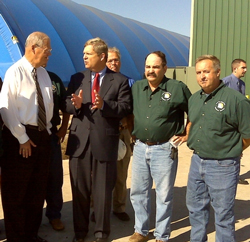 The Canadian government is putting more than $72 million into a biodiesel plant in Ontario.
The Canadian government is putting more than $72 million into a biodiesel plant in Ontario.
This government press release says the money for the BIOX Corporation facility in Hamilton comes from the ecoENERGY for Biofuels program, which works to help stabilize the Canadian renewable fuel industry:
“The Government of Canada is delivering results for families and workers in Hamilton,” said [The Honourable Lisa Raitt, Minister of Natural Resources]. “By investing in this project, our government is helping to create and sustain local jobs and economic opportunities as well as a healthier environment for all Canadians.”
Through the ecoENERGY for Biofuels program, the Government of Canada will invest up to $1.5 billion over nine years to encourage the development of a strong, competitive renewable fuels industry in Canada. Compared with gasoline, grain-based ethanol can reduce greenhouse gas (GHG) emissions by up to 40 percent on a life-cycle basis. For biodiesel, the emissions reduction can be as much as 60 percent.
“This announcement today is ensuring new, green, sustainable manufacturing jobs are being created right here at home,” said [Tim Haig, President and CEO of BIOX Canada Ltd.]. “Clean-burning renewable fuels such as biodiesel significantly reduce harmful greenhouse gas emissions and finally give drivers a choice at the fuel pump. BIOX is proud to be a world-leader in advanced biodiesel production, and proud to help Canada grow beyond oil.”
 The news was also welcomed by the Canadian Renewable Fuels Association (CRFA):
The news was also welcomed by the Canadian Renewable Fuels Association (CRFA):
“BIOX is using a new advanced technology at their facility in Hamilton to make a world-class renewable fuel,” said CRFA President Gordon Quaiattini. “Biodiesel significantly reduces greenhouse gas (GHG) emissions, as well as reducing many other harmful air pollutants. This is on top of bringing about diversity at the fuel pump for all drivers and consumers.”
BIOX is the largest producer of biodiesel in Canada.
 Prices for diesel continue to climb in the U.S., hitting their highest point of the year… and that’s good news for producers of green, renewable biodiesel.
Prices for diesel continue to climb in the U.S., hitting their highest point of the year… and that’s good news for producers of green, renewable biodiesel.

 The Colorado Corn Growers Association, the Governor’s Biofuels Coalition, Western Convenience Stores and Southern Colorado Clean Cities in Colorado Springs are partnering to celebrate the opening of a new E85 pump location at 227 West Fillmore Street in Colorado Springs, Colorado, on August 26. This will be the ninth station selling E85 in Colorado Springs.
The Colorado Corn Growers Association, the Governor’s Biofuels Coalition, Western Convenience Stores and Southern Colorado Clean Cities in Colorado Springs are partnering to celebrate the opening of a new E85 pump location at 227 West Fillmore Street in Colorado Springs, Colorado, on August 26. This will be the ninth station selling E85 in Colorado Springs.  The Obama administration’s
The Obama administration’s  Agriculture Secretary Tom Vilsack says the biomass facility is taking wood, corn stalks and other crop residue and converting it into pellets that can be used to produce energy or a substitute for propane on the farm.
Agriculture Secretary Tom Vilsack says the biomass facility is taking wood, corn stalks and other crop residue and converting it into pellets that can be used to produce energy or a substitute for propane on the farm.  A one-million-gallon-a-year algae-biodiesel plant could soon become a reality for Massachusetts with some help from the state and federal governments.
A one-million-gallon-a-year algae-biodiesel plant could soon become a reality for Massachusetts with some help from the state and federal governments. The bad news is: According to
The bad news is: According to 
 A pair of three-year National Science Foundation grants will help the St. Louis-based Donald Danforth Plant Science Center continue its biofuel research.
A pair of three-year National Science Foundation grants will help the St. Louis-based Donald Danforth Plant Science Center continue its biofuel research. The Canadian government is putting more than $72 million into a biodiesel plant in Ontario.
The Canadian government is putting more than $72 million into a biodiesel plant in Ontario. The news was also welcomed by the Canadian Renewable Fuels Association (CRFA):
The news was also welcomed by the Canadian Renewable Fuels Association (CRFA):
 The recent American Coalition for Ethanol’s 22nd Ethanol Conference & Trade Show in Milwaukee saw an exploration of an issue that remains a hot issue in the biofuels biz: Indirect Land Use.
The recent American Coalition for Ethanol’s 22nd Ethanol Conference & Trade Show in Milwaukee saw an exploration of an issue that remains a hot issue in the biofuels biz: Indirect Land Use. The concept that the growth of some biofuels feedstocks in the United States, especially corn and soybeans, could cause the cutting down of the rain forests in other parts of the world… and would disqualify some of the green fuels from being part of the proposed Renewable Fuels Standard.
The concept that the growth of some biofuels feedstocks in the United States, especially corn and soybeans, could cause the cutting down of the rain forests in other parts of the world… and would disqualify some of the green fuels from being part of the proposed Renewable Fuels Standard. The latest discussion featured energy economist from Purdue University Wally Tyner and Air Improvement Resource President Tom Darlington, who talked about how studies that blamed corn-based ethanol for deforestation ended up being wrong and how the most common economic models used to figure the amount of Indirect Land Use vary too much and don’t consider things like dry distillers grains.
The latest discussion featured energy economist from Purdue University Wally Tyner and Air Improvement Resource President Tom Darlington, who talked about how studies that blamed corn-based ethanol for deforestation ended up being wrong and how the most common economic models used to figure the amount of Indirect Land Use vary too much and don’t consider things like dry distillers grains. The city of Gary, Indiana plans to replace 120 cars and trucks in its aging auto fleet this year with new flexible fuel vehicles (FFVs) paid for with a $3 million grant from the Federal Highway Administration.
The city of Gary, Indiana plans to replace 120 cars and trucks in its aging auto fleet this year with new flexible fuel vehicles (FFVs) paid for with a $3 million grant from the Federal Highway Administration.